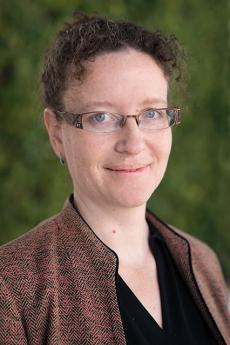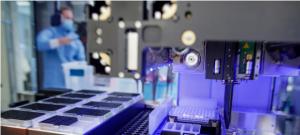Engineering Solutions for a Complex World
LETTER FROM THE DEPARTMENT CHAIR
The biggest challenges of our day – climate change, public health, infrastructure, innovation, privacy and connectivity – have systems at their root. At the George Washington University School of Engineering and Applied Science (GW Engineering) our faculty, students, and alumni are on the front lines developing solutions.
Within the Department of Engineering Management and Systems Engineering (EMSE), we tackle an extraordinary array of interesting and important challenges. From managing global supply chains and understanding the planet’s climate system to investigating the spread of malicious content online, we pursue interdisciplinary, problem-driven research, seeking to understand how the parts of complex systems fit together. Alongside policymakers and technology leaders, we’re developing and delivering solutions, improving decision making and having an impact on the world around us.
To solve the complex problems that cross disciplines, countries, and cultures, professional engineers must understand both the technologies being developed and the rapidly changing environments in which those technologies will be applied. At GW Engineering’s EMSE department, we apply a set of rigorous analytical tools and systems-level thinking to problems, considering both the technologies and the frameworks in which they will be embedded. Combining engineering, management, business analytics and technology, we provide today’s engineers, scientists, business professionals and policymakers with the skills they need to enhance management and decision-making within their organizations.
Zoe Szajnfarber, Ph.D.
Professor and Chair,
Department of Engineering Management & Systems Engineering
NEW FACULTY
Professor Caitlin Grady studies the form and functions of interconnected infrastructure across water, food, and energy systems. Her research seeks to combine network models, socio-technical data, and ethical-epistemic analyses to create a more sustainable and secure environment. Current projects include modeling embedded nitrogen trade and its influence on water quality, climate change impacts on hydropower and the U.S. electricity grid, ethical implications of research choice in spatial science, and managing critical infrastructure under uncertainty. Her work is currently supported by the National Science Foundation and the U.S. Department of Agriculture.
Professor Eric Dano comes from over 25 years in the defense industry with his primary focus on improving the practice of system architecture for complex engineered systems. Prior to industry, Professor Dano served as an Electronics Countermeasures Officer in the United States Marine Corps, flying in the EA-6B Prowler. His research interests include the introduction of system thinking principles into undergraduate education, defining data exchanges to tie together various domain models for assessing architectural alternatives, implementation of model-based engineering, and the use of system optimization techniques to assess system modularity, resiliency, supportability or other desired system attributes over the system lifecycle.
CREATING TRUSTWORTHY AI SYSTEMS TO ENSURE EQUITY IN THE REAL WORLD
experts to learn about search and rescue, and to consider potential opportunities
for AI to support their operations.
AI is becoming more deeply integrated within all parts of modern society, driving advances in science, engineering, the workforce, transportation, and social interaction. This integration creates a tension between the opportunities for ubiquitous AI to transform our world and the emergent risks around bias, security and privacy that arise.
GW Engineering will play a leading role in developing the next generation of AI algorithms and systems and build an understanding of how those systems can be best integrated within society. Ph.D. fellows from GW’s Designing Trustworthy AI Systems (DTAIS) program are gaining firsthand knowledge about convergent problems in artificial intelligence and machine learning.
DTAIS is an NSF Research Traineeship (NRT) administered by the GW departments of Computer Science and Engineering Management and Systems Engineering. Our NSF funding allows us to support full-time PhD students pursuing critical research that lies outside the bounds of traditional disciplines. At the same time, DTAIS remains committed to innovative modes of instruction, interdisciplinary education and broadening STEM education to communities typically excluded from participation. In the future, DTAIS will offer a graduate certificate for students and professionals to gain the competency needed to address questions in this space and lead initiatives at their organizations.
The DTAIS community brings together dedicated students, faculty and professionals to shape our relationship to AI and the workplace of tomorrow. Our students receive mentorship from professors across campus and experts in industry, and our academic and professional partners gain access to passionate early researchers eager to make a difference.
ENERGY INNOVATION TO IMPROVE OUR WORLD
With the world’s growing population and widespread economic development, the interrelated challenges of energy, water, and food security have become key global concerns. These concerns are the focus of Associate Professor Ekundayo Shittu’s System Modeling Laboratory for Economic Decisions (SysMoLED). His group takes a complex systems perspective to understand the interrelationships between economic, policy, human, physical, and environmental issues.
With support from the National Science Foundation (NSF), SysMoLED is developing new mathematical modeling frameworks to decipher the complexities of food-energy-water systems. It uses an agent-based representation of the linkages among food, energy and water subsystems and between human and physical systems across multiple temporal and spatial scales. The goal is to enable coordination among stakeholders and policy coherence, so that security can be improved in the water, energy, and food sectors simultaneously.
In a related project funded through NSF’s Faculty Early Career Development Program (CAREER), SysMoLED is focusing on electricity infrastructure and investments. They are investigating new ways to incentivize investments into electricity infrastructure systems, through questions such as how much to invest in a particular electricity technology portfolio in order to enhance system resilience to disruptions. In addition, they are developing innovative ways to enhance the participation of public-private enterprises in community resilience efforts, inspired by the self-healing properties in biological systems. The outcomes will include decision support platforms for policymaking that can translate these ideas to practice.
Last but not least, SysMoLED is examining the factors that influence community solar adoption, including in low- and middle-income households. They will investigate variety of related issues, including financing and economies of scale, community education, project coordination, links to related efforts like grid modernization and resiliency, and a variety of standards and policies. The goal is to understand how the market potential for community solar might be further unlocked beyond the group of early adopter utilities and developers.
These interrelated projects are critical to energy, water, and food systems’ resilience as climate change threatens a growing number and variety of disruptions. All three projects are firmly grounded in real problems and aim to impact energy infrastructure decision-making and policy.
MODELING FOR MEDICAL PROCESSES: IMPROVING THROUGHPUT IN COVID TESTING
Erica Gralla, Associate Professor of Engineering Management and Systems Engineering, led a study on speeding up COVID-19 testing processes during the height of the pandemic in 2020-2021. Her team worked with a large University of Maryland testing center serving the State of Maryland and identified process changes that could nearly double their capacity with minimal investment of resources. Key to this effort was a focus on the laboratory operations and processes.
Despite clear operational challenges such as supply availability and personnel shortages, there have been very few attempts to examine these processes systematically.
capacity improvements.
Supported by a rapid response grant, the team developed a discrete event simulation model to represent the complex process steps involved in PCR testing, then used the model to identify bottlenecks, explore resilience to surges in demand, and evaluate potential changes to improve the process. One key insight was a significant bottleneck in the time-consuming “de-swabbing” step. A simple process change could alleviate this bottleneck: a virucidal sample collection medium to enable safe discarding of swabs at the point of collection. With this change, the capacity of the laboratory nearly doubled.
Supported by a rapid response grant, the team developed a discrete event simulation model to represent the complex process steps involved in PCR testing, then used the model to identify bottlenecks, explore resilience to surges in demand, and evaluate potential changes to improve the process. One key insight was a significant bottleneck in the time-consuming “de-swabbing” step. A simple process change could alleviate this bottleneck: a virucidal sample collection medium to enable safe discarding of swabs at the point of collection. With this change, the capacity of the laboratory nearly doubled.
This research was critical because testing capacity fell far short of the need in Maryland, and throughout the United States and the world. Prompt testing was especially critical to mitigating the COVID-19 pandemic before vaccines were available, since it allowed cases to be identified and isolated before the disease could spread further. Long wait times for results were common, and many people were simply unable to access tests. This research project not only helped to improve capacity in one laboratory but also emphasized the importance and potential impact of examining operational processes in COVID-19 testing laboratories – unfamiliar territory to many public health and laboratory experts.
Key to enabling these insights was an interdisciplinary research team, including University of Maryland professors Jacques Ravel from the Department of Microbiology and Immunology and Patti Gravitt from the Department of Epidemiology and Public Health, Polytechnique Montreal professor Nadia Lahrichi from the Department of Mathematics and Industrial Engineering, and Gralla and student Jad El Hage from GW’s Department of Engineering Management and Systems Engineering. The team has since expanded on this work to study COVID-19 testing processes elsewhere in the United States and across the globe.
INSTITUTE FOR DATA, DEMOCRACY, AND POLITICS
David A. Broniatowski, Associate Professor in the Department of Engineering Management and Systems Engineering, serves as the Associate Director of the GW Institute for Data, Democracy & Politics (IDDP). IDDP’s mission is to help the public, journalists, and policymakers understand digital media’s influence on public dialogue and opinion, and to develop sound solutions to disinformation and other ills that arise in these spaces. Professor Broniatowski brings his experience as an interdisciplinary systems engineer to bear in his role at IDDP, helping to coordinate research and promote collaboration between the many different academic disciplines working on problems related to IDDP’s mission. These disciplines include, but are not limited to, computer science, electrical and computer engineering, systems engineering, political science, public health, anthropology, experimental psychology, and data science. Beyond the academic mission of IDDP, this work has an inherently practical bent: in the heart of the nation’s capital, IDDP brings together top researchers from across academic disciplines, works side-by-side with and informs journalists from leading media outlets, advises and helps agenda set with policymakers in the U.S. and Europe, and engages with a variety of organizations that have significant societal influence and reach.
This work is of vital importance in an age when media manipulation, fake accounts, and malicious social media activities are undermining fundamental aspects of societal cohesion and democratic ideals. Abuse, harassment, hate speech, and disinformation abound, with foreign and domestic actors alike taking advantage of key features of digital platforms to target vulnerable and marginalized members of society. For example, misinformation about COVID and other health conditions is widely spread online, and has led to suppressed vaccine uptake rates, prolonging the COVID pandemic and facilitating the spread of new viral variants. Professor Broniatowski’s research focuses especially on how malicious actors take advantage of the architecture of social media platforms to advance several different agendas, including carrying out geopolitically-, economically-, and ideologically driven aims. Additionally, he studies how social media platform architectures facilitate or hinder the ability of platform designers to control or otherwise moderate misinformation spread. This research has direct design implications for major social media companies as they continue to struggle with how to manage these online harms in the face of rapid societal change.
Download the EMSE Department Brochure (pdf)










